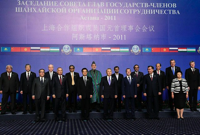The Shanghai Cooperation Organization (SCO) celebrated its 10th anniversary last week, with the leaders of its six member states gathering in Astana, Kazakhstan, for the occasion. In addition to assessing the achievements of the organization's first decade, SCO leaders also considered the applications of Pakistan, India, Mongolia and Iran for full membership. There are now increasing indications that India and Pakistan might be admitted, although not before next year.
Nevertheless, admission of these two nations could alter the mission and global relevance of the SCO as a regional multilateral organization. The SCO was initially created as a security pact to maintain stability in Central Asia and discourage foreign military presence in the region. The arrival of India and Pakistan would sharply expand the geographic reach of the SCO and the population it represents, transforming the group from a central Asian security organization to an Asian one with a combined population of more than 2.5 billion people.
The question remains, how will the SCO's priorities change with enlargement? Since its inception, the SCO has been committed to two important objectives: combating Islamic extremist and political instability in Central Asia. Commitment to these goals is likely to continue after enlargement. Indeed one of the potential incentives of current SCO members for admitting Pakistan is to enhance their ability to fight Islamic extremists. They believe that Taliban and other Jihadist groups in Pakistan -- and Afghanistan -- provide material and moral support for militant Islamic groups operating in Central Asia. If Pakistan joins the SCO, it will have an added incentive to contain Pakistan-based extremist groups and break their links with Central Asia.

